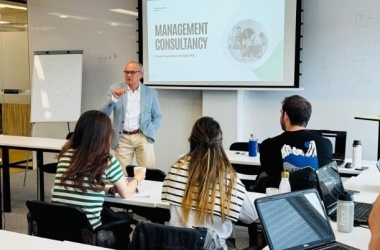Wittenborg Online News!
Exploring the Role of a Management Consultant with Eduard Vorsterman van Oijen
Exploring the Role of a Management Consultant with Eduard Vorsterman van Oijen

Exploring the Role of a Management Consultant with Eduard Vorsterman van Oijen
How to Be a Management Consultant and Survive in the Industry
On 6 and 11 June, Eduard Vorsterman van Oijen delivered two guest lectures for MBA (Master of Business Management) students at Wittenborg’s Apeldoorn and Amsterdam study locations. Eduard, a management consultant with extensive experience across various sectors, provided invaluable insights into the consulting profession, leadership and business development.
What is a consultant?
Eduard defines a consultant as, “a professional who provides advice or services in an area of specialisation. Consulting services generally fall under the domain of professional services as contingent work. The Harvard Business School defines a consultant as someone who advises on ‘how to modify, proceed in, or streamline a given process within a specialised field.’”
During his lectures, Eduard emphasised the importance of understanding people’s backgrounds and interests. He noted, “You need to understand the background of the students. For instance, if a student’s focus is financial management, I ask them how they plan to use that knowledge. The job may require different skills and interests than what is taught in their studies.”
Eduard reflected on his own career path, sharing, “When I began as a management consultant, I pursued post-academic studies to deepen my expertise. This approach helps bridge the gap between theoretical knowledge and practical application in consulting careers.”
How do they earn money?
A crucial aspect of Eduard’s consulting work involves understanding how businesses generate revenue and developing effective strategies for success. He explained, “To truly grasp a business’s operations, you must ask, ‘How do they earn money?’ This question is central to evaluating their primary processes and crafting successful strategies.”
Eduard elaborated on his approach to business organisation development, stating, “It’s about understanding the mission and vision of the organisation, formulating strategies for success, and then figuring out how to implement these strategies. This involves both primary processes, like core operations, and secondary processes, such as financial administration and human resources.”
Leadership and organisational culture
Eduard also shared his thoughts on leadership, particularly in the context of challenging or toxic work environments. He observed, “Toxic work cultures often stem from dominant and unreflective leaders. Effective leadership is not merely about skills but about character and attitude. It’s crucial for leaders to reflect on their actions and understand how their leadership style impacts others.”
He emphasised the importance of reflection in leadership, adding, “Reflection is vital. Narcissistic leaders often lack this quality, which can lead to toxic environments. Success in leadership requires more than just having the right skills; it’s about having the right attitude and character.”
The role of technology in consulting
In discussing the impact of technology on management consulting, Eduard highlighted both its opportunities and challenges. He said, “Technology is a significant component of modern consulting. It helps streamline processes, analyse data and improve efficiency. However, it must be applied thoughtfully, always considering how it affects both primary and secondary business processes.”
Eduard believes that technology, including AI and robotics, should be used to support organisational goals and not just as a superficial solution. He remarked, “Technology should enhance existing processes and support the organisation’s objectives, rather than just serving as a quick fix.”
The importance of personal development
Eduard concluded the interview with reflections on personal development in consulting. He said, “Consulting is as much about personal growth and reflection as it is about applying theoretical knowledge. Transparency, character and a reflective mindset are essential for success in both consulting and leadership roles.”
He added, “It’s important to focus on personal development and not just on technical skills. Effective consultants and leaders are those who can reflect on their actions and remain transparent and ethical in their work.”
WUP 08/08/2024
by Erene Roux
©WUAS Press
637 words